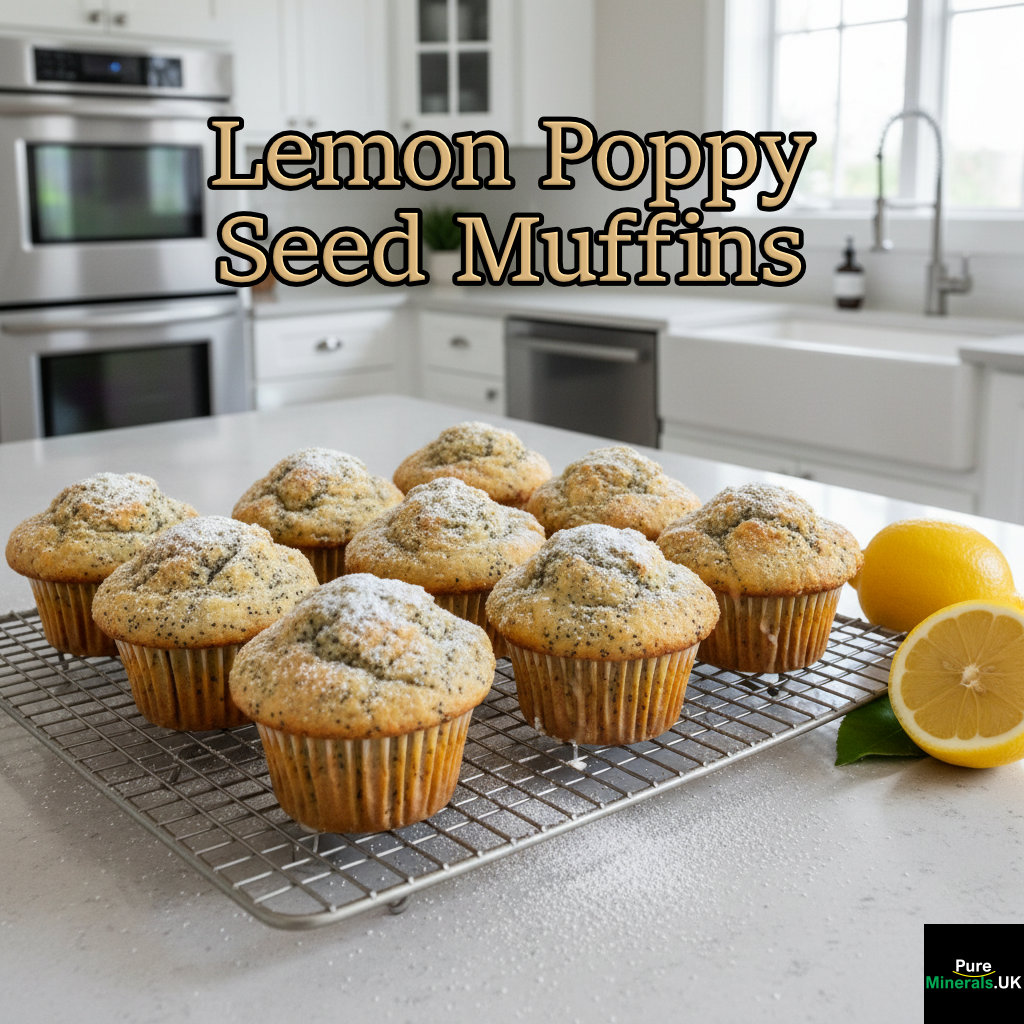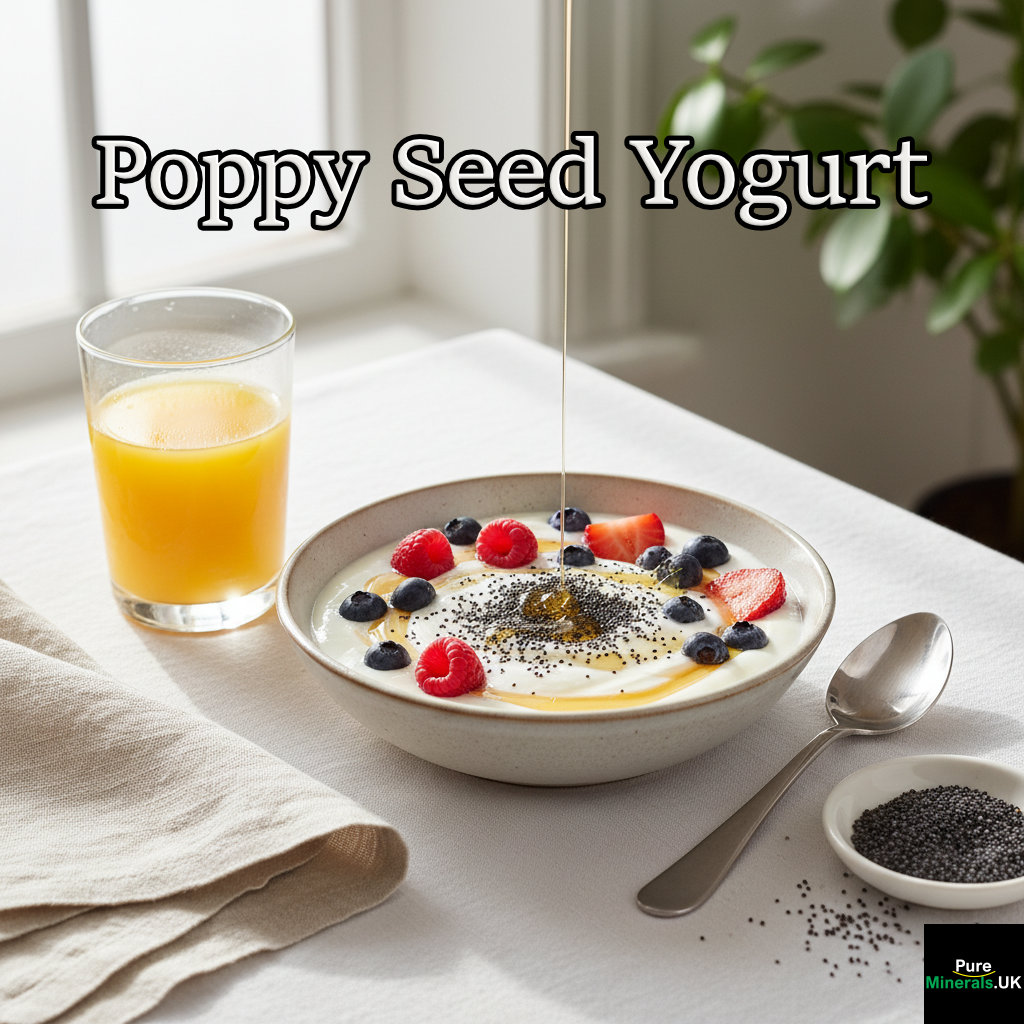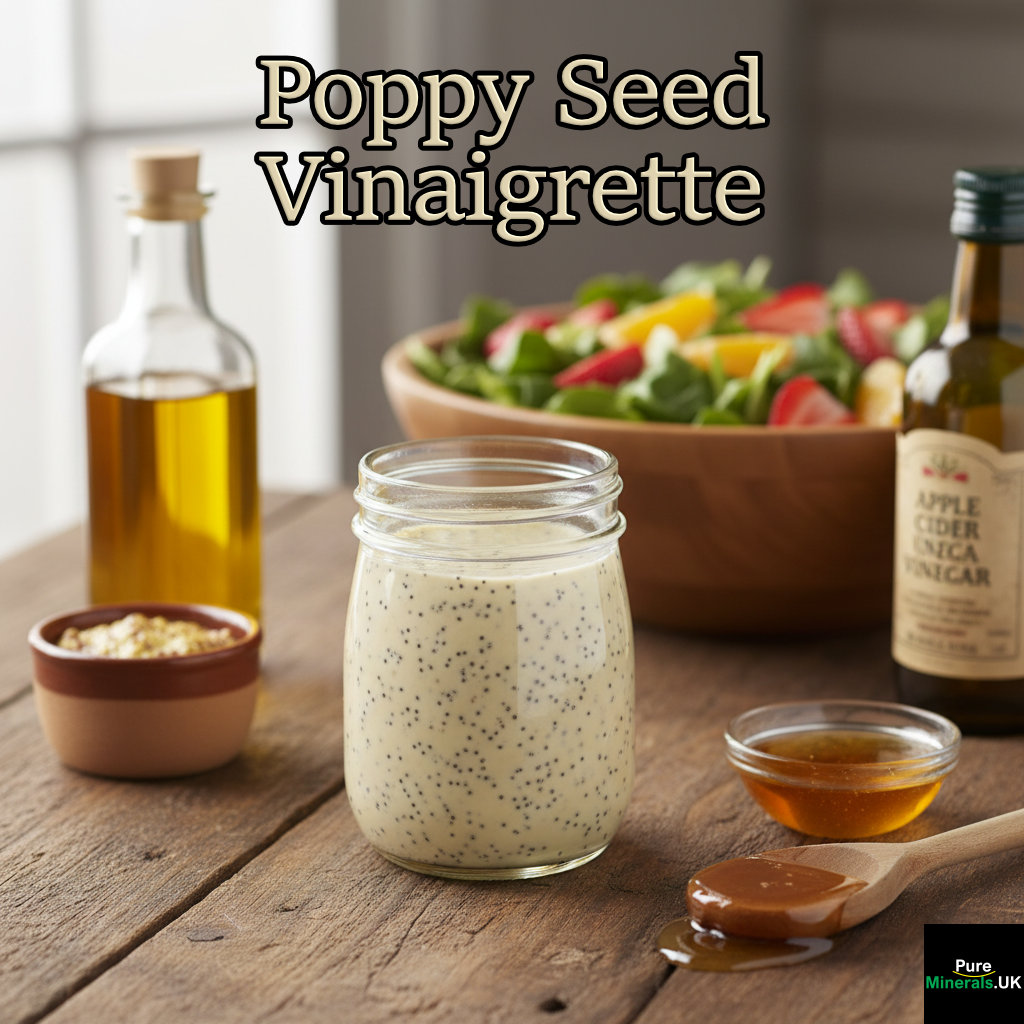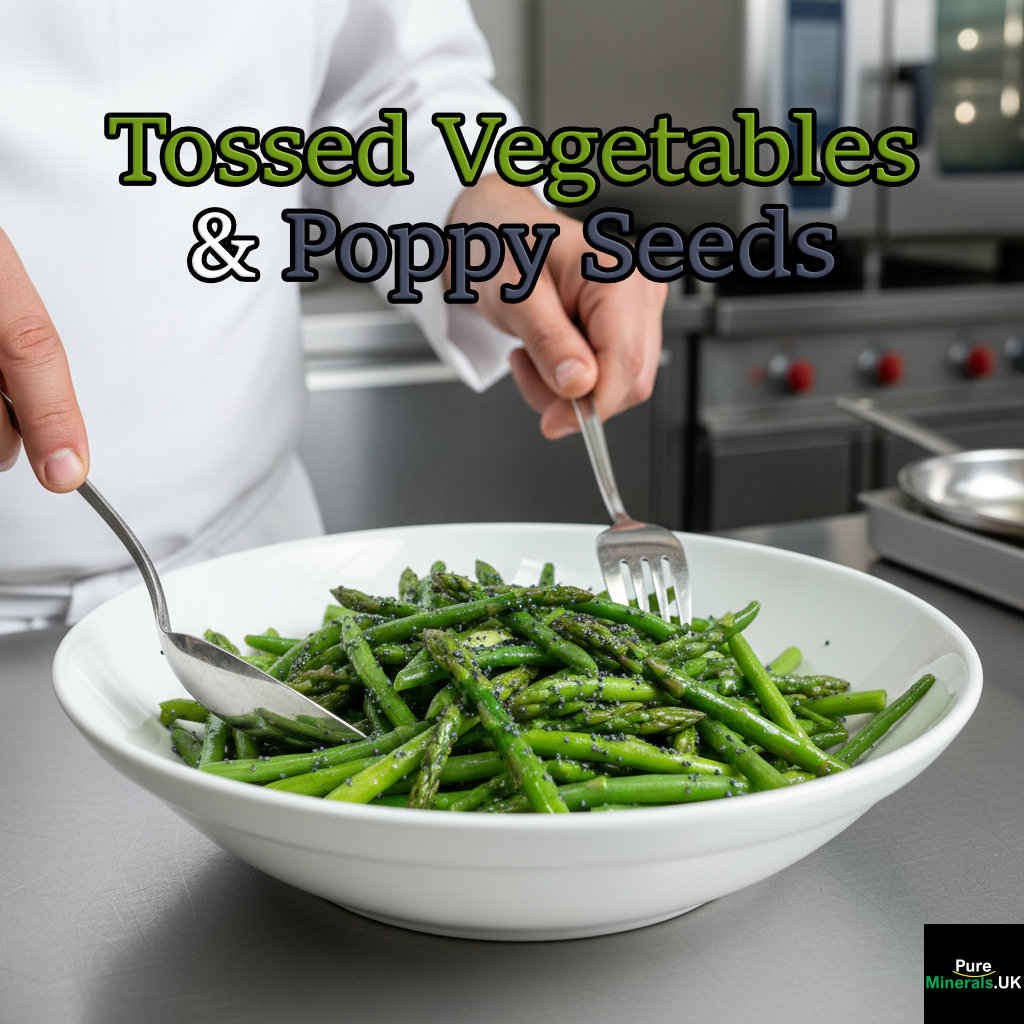
Key Takeaways
- Poppy seeds are rich in calcium, magnesium, and zinc, making them excellent supporters of bone health and immune function.
- Just one tablespoon of poppy seeds provides nearly 30% of your daily manganese needs, supporting bone development and reducing inflammation.
- These tiny seeds have been used in sacred rituals and traditional medicine for thousands of years across multiple civilizations.
- The healthy fats and dietary fiber in poppy seeds make them beneficial for heart health and digestive regularity.
- Premium Spices offers high-quality blue poppy seeds that can easily enhance both sweet and savory dishes while delivering impressive nutritional benefits.
Poppy seeds may be tiny, but they pack a mighty nutritional punch that’s been valued across civilizations for thousands of years. These small black, white, or blue seeds derived from the poppy flower (Papaver somniferum) offer far more than just a pleasant crunch in your favorite baked goods.
Despite their association with the opium poppy plant, the seeds themselves contain negligible amounts of opiate compounds and are completely safe for consumption. What they do contain is an impressive array of essential nutrients that can support everything from bone health to digestive wellness. Premium Spices’ blue poppy seeds stand out for their exceptional quality and nutritional profile, making them an excellent addition to a health-conscious diet.

Beyond their culinary uses, these small seeds carry centuries of cultural significance that make their story as rich as their nutritional profile. Let’s explore why these diminutive seeds deserve a prominent place in your pantry and wellness routine.
Why These Tiny Seeds Pack a Mighty Nutritional Punch
When it comes to nutrient density, few foods can compare to poppy seeds pound for pound. These minuscule powerhouses contain impressive amounts of manganese, calcium, copper, zinc, iron, and linoleic acid (an omega-6 fatty acid), along with dietary fiber—all packed into something smaller than a pinhead.
What makes poppy seeds truly remarkable is their mineral concentration. Just one tablespoon provides nearly 30 percent of your daily manganese needs, a mineral essential for bone formation, blood clotting, and protecting cells from oxidative damage. This same tablespoon delivers significant amounts of calcium and magnesium—crucial minerals for maintaining strong bones and proper muscle function.
The Rich History of Poppy Seeds: From Ancient Rituals to Modern Kitchens
The relationship between humans and poppy seeds stretches back to prehistoric times. Archaeological findings have uncovered poppy seed remnants in settlements dating back thousands of years, suggesting these seeds were valued long before written history began.
Throughout antiquity, poppy seeds transcended their status as mere food to become symbols of fertility, abundance, and even immortality in various cultures. Their small size yet prolific nature made them powerful metaphors for life’s potential and renewal.
Origins in Prehistoric Europe and the Mediterranean
Archaeological discoveries have revealed poppy seed remnants in prehistoric settlements across Switzerland, Germany, and the Balkans. These findings suggest that ancient Europeans weren’t just consuming poppy seeds—they were likely cultivating them intentionally as part of their agricultural practices. The seeds’ presence in these early settlements indicates they were recognized for their nutritional value and possibly their medicinal properties thousands of years before modern nutritional science confirmed these benefits.
Sacred Status in Ancient Greece and Rome

In the classical world, poppy seeds achieved an elevated status beyond mere nourishment. Ancient Greeks and Romans mixed poppy seeds with honey or wine during religious ceremonies, believing they promoted fertility and abundance. The association with Demeter, goddess of the harvest and fertility, further cemented their sacred status.
Poppy seeds and their parent plants became symbols in Greek mythology, representing both sleep and fertility—contrasting yet complementary aspects of the human experience. This dual symbolism reflects the plant’s varied properties and the ancient understanding of its complex nature.
Traditional Uses in Eastern European and Middle Eastern Cuisines
As culinary traditions developed across Central and Eastern Europe, poppy seeds became deeply integrated into cultural identity through food. The traditional Polish dessert makowiec—a rolled pastry filled with sweetened poppy seed paste—remains a Christmas Eve staple, while Hungarian beigli serves a similar ceremonial role.
Middle Eastern cuisine embraced poppy seeds in both sweet and savory applications. From sprinkling them atop flatbreads to incorporating them into dense, sweet halva, these cultures recognized both the nutritional value and distinctive flavor poppy seeds bring to diverse dishes.
Today, these culinary traditions continue to evolve, with poppy seeds finding their way into contemporary cooking as chefs rediscover ancient ingredients with modern nutritional significance. Their journey from prehistoric settlements to modern kitchens illustrates humanity’s enduring relationship with these nutritionally dense seeds.
Nutritional Powerhouses: What Poppy Seeds Offer Your Body
Despite their minute size, poppy seeds deliver an impressive array of essential nutrients that support multiple bodily functions. These tiny nutritional gems are particularly notable for their mineral content, which rivals that of much larger food sources.
The nutritional profile of poppy seeds makes them particularly valuable for vegetarians and those seeking plant-based sources of important minerals. Just a small amount sprinkled on food or incorporated into recipes can significantly boost your daily nutrient intake.
Calcium Content: Supporting Bone Health
Poppy seeds are among the most concentrated plant sources of calcium available. A single tablespoon provides approximately 126 mg of calcium—nearly 10% of the recommended daily intake for adults. This makes them an excellent supplementary source of this bone-building mineral, especially for those who limit dairy consumption.
The calcium in poppy seeds works synergistically with their magnesium and manganese content to support optimal bone density and strength. This mineral trio creates the perfect foundation for skeletal health throughout all stages of life, from development to maintenance in later years. For those interested in exploring other sources of minerals, mustard seeds also offer a unique nutritional profile.
Iron Benefits: Combating Fatigue and Anemia
Iron deficiency remains one of the most common nutritional deficiencies worldwide, particularly among women of reproductive age. Poppy seeds offer a valuable plant-based source of iron, with approximately 0.9 mg per tablespoon. While this may seem modest, their concentrated nature makes them easy to incorporate into meals for cumulative iron benefits.
The iron in poppy seeds helps with oxygen transport throughout the body, supports energy production, and assists immune function. When consumed alongside vitamin C-rich foods, the iron absorption from poppy seeds can be significantly enhanced.
Manganese, Zinc, and Other Essential Minerals
The standout mineral in poppy seeds is manganese, with just one tablespoon providing nearly 30% of daily requirements. This often-overlooked mineral plays crucial roles in bone formation, blood clotting, and protecting cells from oxidative damage. Manganese also helps reduce inflammation, which may explain some of the traditional medicinal uses of poppy seeds for joint pain and arthritis.
Additionally, poppy seeds contain meaningful amounts of zinc, copper, and potassium—minerals essential for immune function, energy production, and proper fluid balance. Their diverse mineral profile makes them particularly valuable as a small-volume nutritional supplement to everyday meals. For more information on how these minerals contribute to health, explore the benefits of mustard seeds, which also offer a rich mineral content.
Healthy Fats and Dietary Fiber
Beyond minerals, poppy seeds contain linoleic acid, an omega-6 fatty acid that supports heart health and proper hormone function. These healthy fats contribute to the seeds’ satisfying texture while providing essential nutrients your body cannot produce on its own, similar to the benefits of mustard seeds.
The fiber content in poppy seeds helps support digestive health and promotes a feeling of fullness, potentially aiding weight management efforts. Just one tablespoon provides approximately 1.7 grams of fiber—a notable amount for such a small serving size.
How Poppy Seeds Support Your Health
The rich nutritional profile of poppy seeds translates into numerous potential health benefits. From supporting bone health to improving digestion, these tiny seeds have earned their place in both traditional medicine and modern nutrition science.
1. Bone Strength and Development
The calcium, manganese, and zinc in poppy seeds create the perfect mineral trio for supporting bone health. Calcium provides structural strength, manganese assists with bone formation and mineral absorption, while zinc supports cellular growth and repair within bone tissue.
Regular consumption of poppy seeds may be particularly beneficial during periods of bone development in childhood and adolescence, as well as for preventing bone mineral loss in older adults. Their concentrated mineral profile makes them an efficient supplement to bone-building nutrition programs.
2. Digestive Health and Regularity
The fiber content in poppy seeds supports healthy digestion by adding bulk to stool and feeding beneficial gut bacteria. This can help prevent constipation while promoting regularity—benefits that have been recognized in traditional medicine systems for centuries.
In Ayurvedic traditions, poppy seeds have been used to soothe digestive discomfort and reduce excessive acidity. Their gentle nature makes them suitable for sensitive digestive systems when consumed in appropriate amounts.
3. Potential Sleep Benefits
While poppy seeds contain negligible amounts of opiates, they do contain small amounts of compounds that may promote relaxation. Traditional European remedies have long used poppy seed tea or warm milk with poppy seeds as a gentle sleep aid, particularly for children and the elderly.
The calcium and magnesium in poppy seeds also play supporting roles in sleep regulation, as these minerals help calm nervous system activity and support muscle relaxation. For those seeking natural sleep support, a small amount of poppy seeds incorporated into an evening snack might provide gentle assistance. Learn more about the benefits of mint for relaxation and wellness.
4. Heart Health Support
The linoleic acid and fiber in poppy seeds create a heart-healthy combination that may help manage cholesterol levels and support cardiovascular function. Additionally, their potassium content helps regulate blood pressure by balancing the effects of sodium in the body and supporting proper fluid balance.
5. Skin and Hair Nourishment
The mineral richness of poppy seeds extends to external benefits for skin and hair health. Zinc supports skin healing and repair, while the healthy fats nourish from within. Poppy seed oil, in particular, has been used topically in traditional beauty regimens to moisturize dry skin and add shine to hair, leveraging its rich fatty acid profile for cosmetic benefits.
Different Varieties of Poppy Seeds and Their Uses
Poppy seeds come in several varieties, each with unique characteristics and culinary applications. The differences in color, flavor profile, and traditional uses make each type valuable for specific cooking techniques and regional cuisines. For more detailed information, you can explore the different types of poppy seeds and their unique attributes.
Understanding these distinctions allows you to select the appropriate variety for different recipes, maximizing both flavor and nutritional benefits. While all varieties offer similar nutritional profiles, their subtle differences in taste and appearance can significantly impact your culinary creations.
Blue Poppy Seeds: The Baker’s Choice

Blue poppy seeds are the most common variety found in Western kitchens and are particularly prized in Central and Eastern European baking. Their deep blue-black color creates the characteristic speckled appearance in lemon poppy seed muffins, bagels, and strudels. These seeds have a mild, nutty flavor that becomes more pronounced when toasted, making them versatile for both sweet and savory applications. For those interested in exploring other spices, paprika is another popular choice in European cuisine.
In traditional European baking, blue poppy seeds are often ground into a paste with honey or sugar for use in pastry fillings. The distinctive flavor develops richness when prepared this way, creating the beloved fillings found in Polish makowiec and Hungarian beigli rolls served during holidays and celebrations.
White Poppy Seeds: Popular in Indian Cuisine
White poppy seeds feature prominently in Indian, Middle Eastern, and some Southeast Asian cuisines. Their milder flavor and creamy color make them perfect for thickening sauces and curries without altering the dish’s appearance. In traditional Indian cooking, white poppy seeds (khus khus) are often ground into pastes that form the base of rich, creamy gravies and kormas.
Beyond their culinary applications, white poppy seeds hold particular significance in Ayurvedic medicine, where they’re valued for their cooling properties and digestive benefits. Their gentle nature makes them especially suitable for balancing warming spices in complex Indian dishes while adding nutritional density.
Black Poppy Seeds: Middle Eastern Favorite
Black poppy seeds are slightly stronger in flavor than their blue or white counterparts, with earthy, nutty notes that stand up beautifully to bold Middle Eastern spices and herbs. They’re commonly used in savory applications, particularly sprinkled over flatbreads like naan and lavash before baking, where they add texture, flavor, and visual appeal.
The robust character of black poppy seeds makes them ideal for spice blends like za’atar and dukkah, where they contribute depth and complexity alongside herbs and other seeds. Their slightly higher oil content also makes them excellent candidates for culinary oils with distinctive flavors perfect for finishing dishes.
Culinary Applications: Adding Poppy Seeds to Your Diet
The versatility of poppy seeds extends far beyond the common lemon poppy seed muffin. These nutritional powerhouses can enhance both sweet and savory dishes while delivering their impressive mineral content. Their subtle nutty flavor complements a wide range of ingredients, making them easy to incorporate into diverse cuisines. For example, they pair well with mustard in savory recipes, adding depth and texture to your meals.
From traditional applications that have stood the test of time to modern culinary innovations, poppy seeds offer both flavor and functional benefits to countless recipes. Their ability to add texture, visual interest, and nutritional value makes them a valuable addition to any well-stocked pantry.
Baking With Poppy Seeds: Beyond the Lemon Muffin

While lemon poppy seed muffins might be the most recognized application in American baking, poppy seeds enhance numerous other baked goods. Traditional European kitchens use them in everything from delicate pastries to hearty breads, often in much higher quantities than typically seen in American recipes. The seeds add a pleasant crunch and visual contrast while contributing nutritional benefits.
For maximum flavor, consider toasting poppy seeds lightly before adding them to batters and doughs. This simple step releases their essential oils and enhances their nutty character, transforming them from mere decoration to a defining ingredient. In recipes like Polish makowiec or Hungarian beigli, the seeds are ground into a paste with honey and other ingredients, creating rich, nutrient-dense fillings.
Savory Dishes That Shine With Poppy Seeds
Poppy seeds excel in savory applications, particularly in dressings, spice blends, and as toppings for breads and crackers. Their subtle nuttiness complements vegetables beautifully, adding depth to simple side dishes like sautéed greens or roasted root vegetables. In Eastern European cuisines, poppy seeds frequently appear in pasta dishes, where they’re tossed with butter or sour cream to create simple yet satisfying meals.
Indian cuisine utilizes white poppy seeds as thickening agents in curries and gravies, where they create silky textures while adding nutritional value. The seeds are typically soaked and ground into a paste that dissolves seamlessly into sauces, contributing body and a subtle richness that balances spicier elements in the dish.
Poppy Seed Oils and Pastes
Cold-pressed poppy seed oil offers a delicate, nutty flavor that shines in uncooked applications like salad dressings and finishing oils. Rich in polyunsaturated fats, this specialty oil not only enhances flavor but also delivers heart-healthy benefits. Its relatively low smoke point makes it better suited for cold applications than for high-heat cooking.
Poppy seed paste, made by grinding the seeds with liquid and sometimes sweeteners, forms the backbone of many traditional Central European desserts. Creating this paste at home allows you to control sweetness levels while ensuring maximum freshness and nutrient preservation. Modern adaptations include using poppy seed paste in energy bars, smoothie bowls, and as nutrient-dense toppings for breakfast porridges.
Important Considerations When Consuming Poppy Seeds
Despite their impressive nutritional profile, there are some important considerations to keep in mind when incorporating poppy seeds into your diet. Understanding these factors ensures you can enjoy their benefits safely and effectively.
Drug Testing Concerns: Facts vs. Myths
One of the most common concerns surrounding poppy seeds relates to their potential to trigger false positives on drug tests. While poppy seeds come from the same plant that produces opium, the seeds themselves contain only trace amounts of opiate compounds. However, sensitive tests can sometimes detect these traces, leading to false-positive results for opiates. If you’re subject to regular drug testing, it’s advisable to limit consumption or avoid poppy seeds altogether in the days before testing.
Proper Storage for Maximum Freshness
Due to their high oil content, poppy seeds are prone to rancidity if not stored properly. For maximum freshness and nutritional value, store poppy seeds in an airtight container in the refrigerator or freezer, where they’ll maintain quality for 6-12 months. Always perform a smell test before using stored poppy seeds—if they smell sharp or paint-like rather than pleasantly nutty, they’ve likely gone rancid and should be discarded.
Recommended Daily Intake
While there’s no official recommended daily allowance specifically for poppy seeds, nutritionists generally suggest limiting consumption to 1-3 teaspoons (approximately 3-9 grams) daily to enjoy their benefits without excessive calorie intake. This amount provides meaningful quantities of minerals like calcium, manganese, and zinc while keeping fat and calorie contributions moderate.
Poppy Seed Nutritional Profile (per tablespoon/9g)
Calories: 46
Fat: 3.7g
Carbohydrates: 2.5g
Protein: 1.6g
Fiber: 1.7g
Calcium: 126mg (10% DV)
Iron: 0.9mg (5% DV)
Manganese: 0.5mg (28% DV)
Because poppy seeds are nutrient-dense, even small amounts can make meaningful contributions to your daily mineral intake. For most people, adding a teaspoon to morning oatmeal, incorporating a tablespoon into baked goods, or sprinkling them over salads provides benefits without overconsumption.
Those with specific health conditions, particularly relating to digestion or kidney function, should consult healthcare providers about appropriate consumption levels, as the oxalate content in poppy seeds may be relevant for those prone to kidney stones.
Simple Ways to Incorporate Poppy Seeds Into Your Daily Meals
Adding poppy seeds to your diet doesn’t require elaborate recipes or special culinary skills. These versatile seeds can enhance everyday meals with minimal effort, bringing both nutritional benefits and subtle flavor improvements.
The key to enjoying poppy seeds regularly is finding simple, practical ways to incorporate them into dishes you already prepare. By treating them as a nutritional enhancement rather than a special ingredient requiring dedicated recipes, you’ll find it easier to benefit from their impressive mineral content consistently.
Here are some straightforward ways to make poppy seeds part of your regular meal rotation without significantly changing your cooking habits or flavor preferences. You can also explore incorporating marjoram for an added herbal twist to your dishes.
- Sprinkle over avocado toast for added crunch and nutrition
- Fold into pancake or waffle batter for visual appeal and texture
- Add to homemade granola or energy bar mixtures
- Mix into vegetable sautés during the final cooking stage
- Incorporate into breadcrumb mixtures for coatings and toppings
1. Morning Yogurt and Smoothie Boost

One of the simplest ways to incorporate poppy seeds is by adding a teaspoon to morning yogurt, overnight oats, or breakfast smoothies. The seeds add a pleasant textural contrast while boosting calcium, manganese, and fiber content without significantly altering flavor. This small addition creates a more satisfying breakfast that supports bone health and proper digestion throughout the day.
2. Homemade Salad Dressings

Classic poppy seed dressing combines the seeds with honey, vinegar, oil, and mustard for a sweet-tangy flavor that pairs beautifully with fruit-forward salads. Beyond this traditional application, poppy seeds can enhance virtually any homemade vinaigrette, adding nutritional value and subtle texture.
To make a basic poppy seed dressing, combine 1 tablespoon poppy seeds with ¼ cup olive oil, 2 tablespoons apple cider vinegar, 1 teaspoon honey, and ½ teaspoon Dijon mustard. Whisk thoroughly or shake in a jar until emulsified, then use to dress salads featuring fruits, nuts, or bitter greens.
For a creamier variation, blend Greek yogurt with poppy seeds, lemon juice, and a touch of honey for a protein-rich dressing that doubles as a vegetable dip. This versatile condiment stores well in the refrigerator for up to a week, making it a convenient way to incorporate poppy seeds regularly.
- Classic honey-mustard poppy seed dressing
- Creamy yogurt-based variations
- Citrus-forward vinaigrettes with poppy seeds
- Oil-free options using pureed fruits as the base
3. Vegetable and Grain Side Dishes

Poppy seeds add interest to simple vegetable side dishes and grain preparations with minimal effort. Try tossing steamed vegetables with butter or olive oil and a teaspoon of poppy seeds just before serving, or fold them into rice, quinoa, or couscous for texture and nutritional enhancement. The subtle nuttiness complements both starchy and non-starchy vegetables while contributing valuable minerals to otherwise simple dishes.
4. DIY Energy Balls and Bars

Homemade energy balls provide the perfect vehicle for incorporating poppy seeds into convenient, nutrient-dense snacks. Combine dates, nuts, oats, a tablespoon of poppy seeds, and your choice of flavor additions like vanilla extract, cinnamon, or mace in a food processor. Roll the mixture into bite-sized balls for portable snacks that deliver sustained energy along with the impressive mineral content of poppy seeds.
These no-bake treats store well in the refrigerator or freezer, making them perfect for meal prep and busy schedules. They’re particularly valuable for active individuals, growing children, and anyone needing convenient nutritional support between meals.
Nature’s Tiny Nutritional Gems Worth Adding to Your Diet
Poppy seeds may be diminutive, but their nutritional impact and cultural significance are anything but small. From their ancient ceremonial uses to their modern applications in global cuisines, these tiny seeds have earned their place in both culinary traditions and nutritional science. Their impressive mineral content—particularly calcium, manganese, and zinc—makes them valuable allies for bone health, immune function, and overall well-being, while their versatility in the kitchen ensures they can be enjoyed in countless delicious ways.
Whether you’re sprinkling them on morning yogurt, incorporating them into baked goods, or exploring traditional recipes from cultures that have valued poppy seeds for millennia, these nutritional gems deserve a place in your pantry and your diet. Premium Spices offers exceptional blue poppy seeds that can help you harness these benefits while elevating your culinary creations.
Frequently Asked Questions
Below are answers to some of the most common questions about poppy seeds, their benefits, and proper usage. These insights will help you incorporate poppy seeds safely and effectively into your diet while maximizing their nutritional advantages. For additional flavor options, consider exploring other herbs like oregano to complement your dishes.
Can poppy seeds make you fail a drug test?
Yes, consuming poppy seeds can potentially trigger a false-positive result on drug tests for opiates. While the seeds themselves contain only trace amounts of opiate compounds, these traces can be detectable in sensitive tests. If you’re subject to drug testing, it’s advisable to avoid poppy seed consumption for at least 48-72 hours before the test. Some experts recommend an even longer period of abstention, particularly if the testing is for employment, legal, or athletic purposes, where consequences of a false positive could be significant. Learn more about other herbs and spices that may impact health and wellness.
How should I store poppy seeds to maintain freshness?
Due to their high oil content, poppy seeds are susceptible to rancidity when exposed to heat, light, or oxygen. For maximum freshness and nutritional preservation, store poppy seeds in an airtight container in the refrigerator, where they’ll maintain quality for approximately 6 months. For longer storage, keep them in the freezer, where they’ll remain fresh for up to a year. Always perform a smell test before using stored poppy seeds—fresh seeds should have a mild, pleasant aroma, while rancid seeds will smell sharp or paint-like.
Are poppy seeds safe for pregnant women to consume?
Moderate consumption of poppy seeds is generally considered safe during pregnancy, and they can contribute valuable calcium and iron—nutrients particularly important during this period. However, very high consumption should be avoided due to the trace opiate compounds present in the seeds. For more information on similar spices, you can explore the benefits of paprika.
Some traditional medical systems advise against medicinal use of concentrated poppy seed preparations during pregnancy. As with any dietary consideration during pregnancy, it’s best to discuss poppy seed consumption with your healthcare provider, particularly if you’re considering using them in more than culinary amounts.
For most pregnant women, occasional consumption in baked goods, as toppings, or in dressings presents no concerns while providing nutritional benefits. The key is moderation and using them as part of a varied, nutrient-rich diet.
Do poppy seeds need to be soaked before cooking or baking?
Soaking poppy seeds isn’t strictly necessary for most recipes, particularly when they’re used as toppings or mix-ins for baked goods. However, soaking can enhance digestibility and nutrient absorption while softening the seeds for certain applications. In traditional European recipes that use significant quantities of poppy seeds, like filling for kolaches or makowiec, soaking and grinding is standard practice to create a smooth paste.
If you choose to soak poppy seeds, place them in warm water or milk for 30 minutes to 2 hours before draining and using as directed in your recipe. This step is particularly helpful when preparing poppy seed pastes or when using the seeds as thickening agents in sauces and dressings.
How many poppy seeds should I eat daily for health benefits?
Most nutrition experts recommend consuming 1-3 teaspoons (3-9 grams) of poppy seeds daily to enjoy their health benefits without excessive calorie intake. This amount provides meaningful quantities of calcium, manganese, iron, and zinc while keeping fat and calorie contributions moderate.
The specific optimal amount varies based on individual nutritional needs, overall diet quality, and particular health goals. Those seeking to support bone health might benefit from the higher end of this range, while those using poppy seeds primarily for their culinary properties might consume less.
